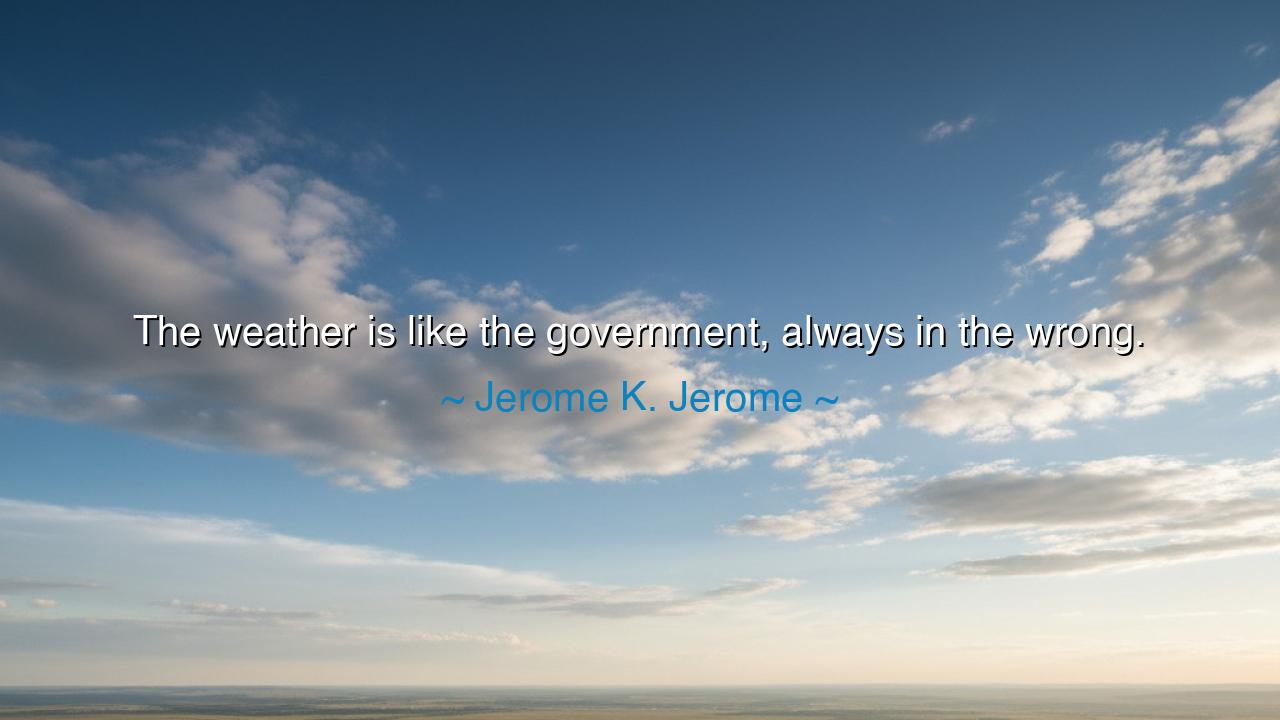
The weather is like the government, always in the wrong.






In the gentle wit and quiet irony of the English spirit, the writer Jerome K. Jerome once spoke a truth that glimmers beneath its humor: “The weather is like the government, always in the wrong.” At first glance, one might smile and take this for a mere jest — a passing observation from a man famed for his comic wisdom. Yet beneath its laughter lies a timeless reflection on the nature of complaint, of human expectation, and of the eternal dance between the governed and those who govern. For in every age, as in every season, people grumble — at the clouds, at the kings, at the ministers of heaven and of earth alike — and in doing so, reveal more of themselves than of the sky or the state.
Jerome K. Jerome, author of Three Men in a Boat, lived in the late Victorian era, when England was both a beacon of empire and a cauldron of discontent. The Industrial Revolution had filled the cities with smoke and hardship; the politics of empire stirred moral unrest. To speak ill of the government was as natural to the common man as to speak ill of the weather, for both seemed vast, impersonal forces forever disappointing human desire. Jerome’s genius was to draw the comparison — to show, with a touch of humor, how the people curse both sky and state with equal futility. His words carry a quiet wisdom: that dissatisfaction, while often justified, is also the shadow that follows all power, whether divine or human.
For who among us has not raised a fist at the heavens when rain falls on the harvest or drought withers the field? And who has not cursed their leaders when policies fail or justice lags behind promise? Yet the weather and the government, each in its own way, are mirrors of our mortality — vast systems we influence but cannot fully command. They act according to laws beyond our full understanding. The farmer may pray for sun, the traveler for cool winds, the sailor for calm seas — yet all cannot be satisfied at once. So too with governance: what lifts one group may burden another. What one calls progress, another names ruin. Thus, the government, like the weather, is “always in the wrong,” not because it always errs, but because the people are many and their desires are infinite.
Consider the example of Abraham Lincoln, who, during the storm of the American Civil War, bore the burden of leadership under constant criticism. To the abolitionist, he was too slow to act; to the conservative, too rash; to the soldier’s widow, too cold; to the pacifist, too bloody. Every decision made him a target, for in times of upheaval, no man in power can please all. Yet history, with the calm of distance, calls him wise. So it is with governments through time: they are scolded in the moment, honored in memory. Like the weather, they pass through tempests to bring forth the calm that only later generations appreciate.
Jerome’s jest also carries a moral about the human heart — that we are quick to condemn what lies beyond our control. It is easier to blame the rain than to mend the roof, easier to curse the state than to better the self. Yet a wise people, like a wise sailor, learns to adjust their sails instead of railing at the wind. Governments, no matter how flawed, reflect the character of those who elect, endure, or accept them. To cry that they are “always wrong” is to forget that they are born of the people’s own hand. The weather is nature’s will; the government is ours.
Still, Jerome’s humor is not without compassion. He laughs, but gently, as one who understands the weary heart of man — that he must grumble to endure. The farmer needs his complaint against the sky, the citizen his jest against the crown. These small rebellions soothe the powerless, giving them the illusion of mastery. And perhaps, in this way, such murmurs are useful, for they remind rulers to stay humble, and remind people that perfection is neither of heaven nor of earth.
The lesson, then, is both humbling and hopeful: accept that both weather and government will never wholly please you, yet do not cease to improve what you can. Build wisely against the storms of nature; vote wisely against the storms of politics. Learn patience with what you cannot change, and responsibility for what you can. Complain less, act more. For while the clouds pass and ministers fall, the enduring spirit of a people lies not in their grievances, but in their perseverance.
And so, my child of tomorrow, laugh as Jerome laughed — with wit, but with wisdom. When you find the government “always in the wrong,” remember that it is the reflection of the people themselves. When you curse the weather, remember that the storm, too, passes. Both are forces beyond perfect control, yet both yield, in time, to those who endure them with courage, patience, and grace. For though the skies may darken and rulers may fail, the sun of human resilience always rises again.






AAdministratorAdministrator
Welcome, honored guests. Please leave a comment, we will respond soon